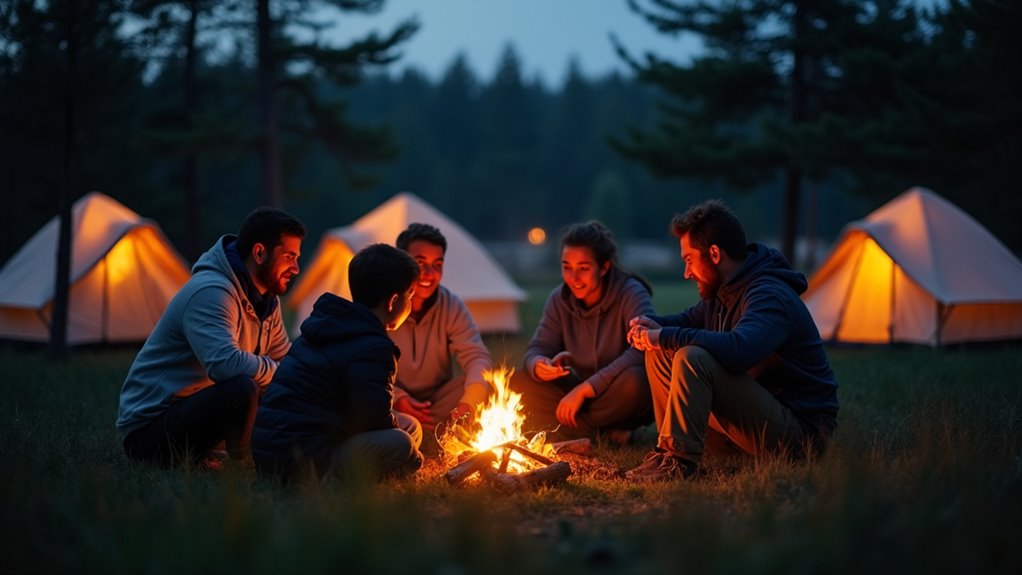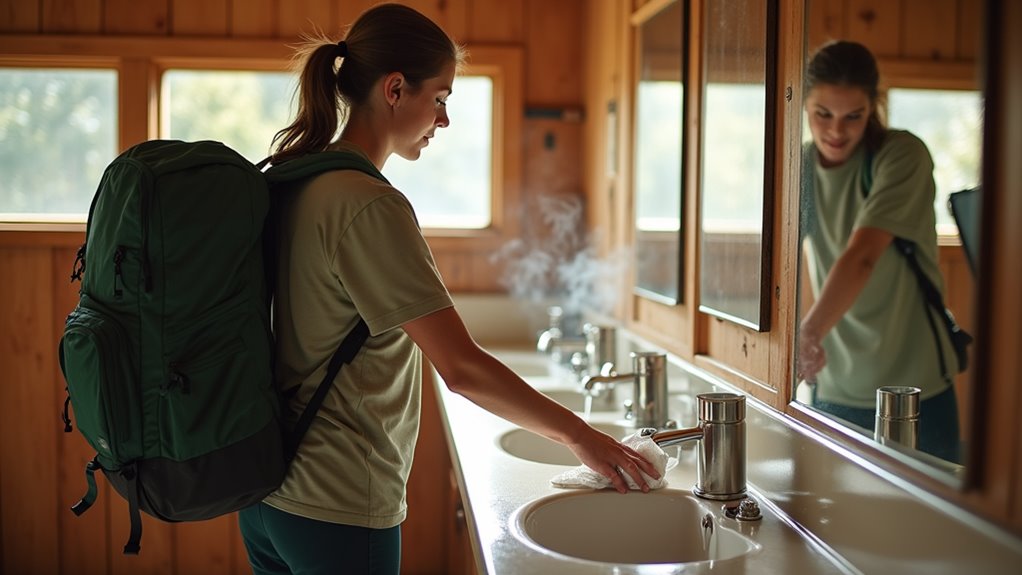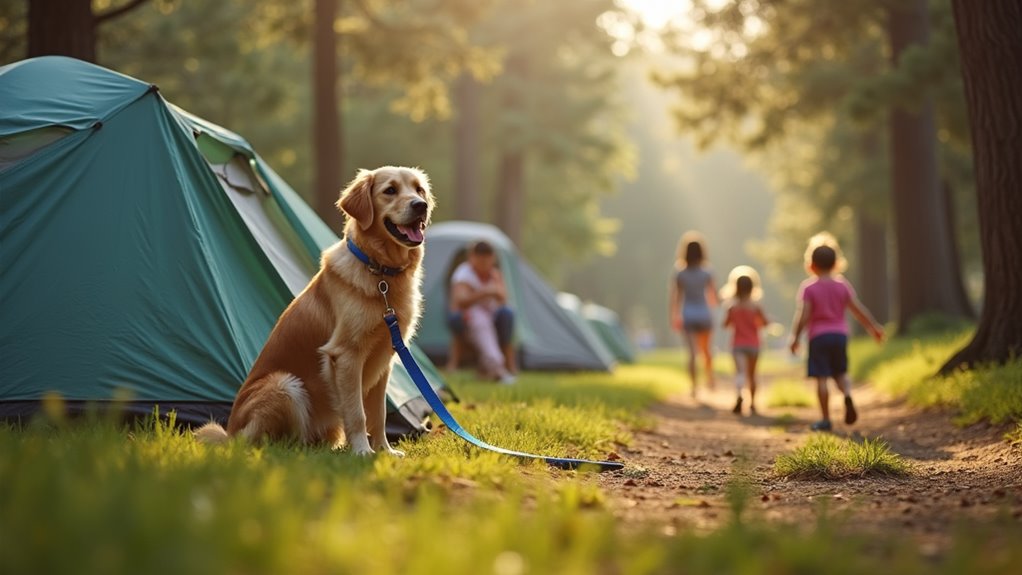Physical Address
304 North Cardinal St.
Dorchester Center, MA 02124
Physical Address
304 North Cardinal St.
Dorchester Center, MA 02124

How can you transform from that annoying camper everyone avoids into the respectful neighbor who makes everyone's outdoor experience better?
Like ripples spreading across a still lake, your actions at the campground affect everyone around you. You’ve probably experienced that one inconsiderate camper who ruined the peaceful vibe – the late-night party crowd or the unrestrained dog chaos. But here’s the thing: you can be the camper who actually enhances others’ experience instead of detracting from it. The difference between being welcomed back and getting side-eye from fellow campers comes down to mastering a few essential courtesies.

When you’re surrounded by nature’s tranquility, you’ll want to preserve that peaceful atmosphere for everyone at the campground. Most campgrounds enforce quiet hours from 10 PM to 6 AM, but you should keep noise levels reasonable throughout your stay.
Keep conversations at a moderate volume, especially near neighboring sites. When you’re setting up camp or cooking, work efficiently without excessive banging or shouting. If you’re playing music, use headphones or keep the volume low enough that others can’t hear it from their sites.
Generators should only run during designated hours, typically midday periods. Remember that sound travels farther in open spaces, so what seems quiet to you might be disruptive to others trying to sleep or enjoy nature’s sounds.
For single mothers camping with children, establishing these noise boundaries early helps teach kids proper campground etiquette while ensuring a pleasant experience for all campers.
Respecting your neighbors’ space creates a more comfortable experience for everyone at the campground. Stay within your designated campsite boundaries and avoid cutting through other people’s sites as shortcuts. Don’t set up chairs, tables, or equipment that extends into neighboring areas.
Maintaining clear boundaries between campsites ensures everyone can relax and enjoy their outdoor experience without unnecessary intrusions or conflicts.
Keep your belongings organized within your space rather than spreading them across multiple sites. When walking around the campground, use established paths and roads instead of wandering through occupied campsites.
Give other campers privacy by avoiding lingering near their tents or RVs, and don’t peer into their windows or living spaces.
If you need to retrieve something that’s rolled into a neighbor’s site, politely ask permission first. These simple courtesies help maintain the peaceful atmosphere that makes camping enjoyable for everyone.
Following these responsible camping practices ensures that all visitors can enjoy the natural environment while maintaining mutual respect and consideration.

Just as you respect your neighbors’ physical space, you’ll want to show the same courtesy in shared bathrooms, showers, and kitchen areas. Clean up after yourself immediately—wipe down surfaces, sweep crumbs, and dispose of trash properly. Don’t hog facilities during peak hours when others are waiting. Keep your personal items contained and remove them when you’re finished.
In restrooms, flush toilets and leave sinks spotless. Shower areas should be free of hair and soap residue.
Kitchen spaces require extra attention—wash dishes thoroughly, clean grease splatters, and sanitize prep areas.
Pack your own cleaning supplies like disinfectant wipes and paper towels. You’ll be prepared to tackle messes quickly without relying on potentially empty dispensers. Your fellow campers will appreciate your thoughtfulness.
When washing dishes at shared facilities, ensure you have clean water by bringing reliable water filters that can help maintain hygiene standards throughout your camping trip.
Fire safety ranks among the most critical responsibilities you’ll have as a camper, and mastering proper campfire etiquette protects both the environment and your fellow outdoor enthusiasts. Always check local fire restrictions before lighting any fire, and use only designated fire rings or established fire pits.
Keep your fire small and manageable—you don’t need a bonfire to stay warm or cook food.
Never leave your fire unattended, even for a few minutes. When you’re ready to extinguish it, pour water over the flames, stir the ashes with a shovel, then add more water. The ashes should be completely cold to the touch.
Collect and properly dispose of any trash around the fire area, leaving the site cleaner than you found it.
Just as you might consider whether to rent or buy a boat for different water activities, evaluate your camping frequency to determine if investing in quality fire safety equipment makes sense for your outdoor adventures.

When you bring your furry companions on camping adventures, you’re responsible for ensuring they don’t disrupt other campers’ experiences or harm the natural environment. Always keep your pets on a leash, even if they’re well-behaved at home. Campgrounds have different rules, wildlife, and unfamiliar scents that can trigger unexpected behavior.
Clean up after your pets immediately and dispose of waste properly. Never leave pet waste on trails or campsites. Bring enough water for your animals and don’t let them drink from natural water sources, which can spread diseases.
Keep noise levels down by preventing excessive barking, especially during quiet hours. If your pet becomes agitated or won’t settle, consider taking them for a walk or moving to a more isolated area until they calm down.
Teaching children how to interact safely with pets around the campsite helps create positive camping activities that everyone can enjoy together.
Beyond caring for your pets, you’ll want to extend that same respect to the entire campground and surrounding wilderness. The Leave No Trace principle isn’t just a suggestion—it’s essential for preserving these spaces for future campers.
Pack out everything you brought in, including food scraps and micro-trash like bottle caps. Even biodegradable items like banana peels can take months to decompose and attract unwanted wildlife. Keep your campsite cleaner than you found it by picking up litter left by previous visitors.
When traveling to destinations like Melbourne, many backpackers choose eco-friendly accommodations that share similar environmental values and commitment to sustainable practices.
You’ll become everyone’s favorite camping neighbor by following these simple guidelines. Keep your noise down, respect boundaries, and clean up after yourself—it’s really that straightforward. Your thoughtfulness will create ripple effects of positivity that spread through the entire campground like wildfire. When you manage your pets responsibly and practice proper fire safety, you’re not just camping—you’re building a community where everyone can truly enjoy nature’s peace together.